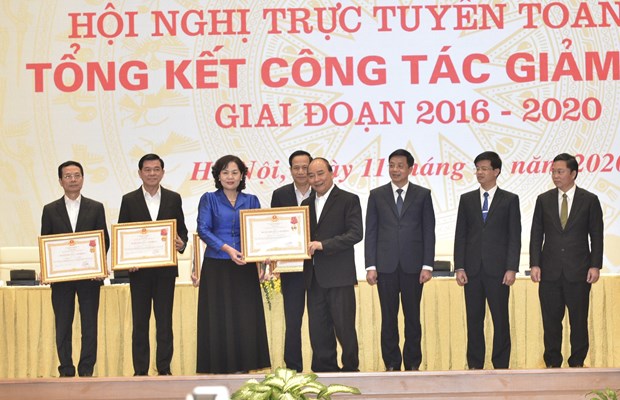Support policies needed to sustain poverty alleviation: PM
Policies to support the impoverished, particularly children, the elderly and ethnic minority people, should be completed to ensure that no one is left behind, Prime Minister Nguyen Xuan Phuc has said.
 Prime Minister Nguyen Xuan Phuc (front, right) presents a third-class Labour Order to the State Bank of Vietnam in recognition of the bank's contributions to poverty reduction (Photo: VNA)
Prime Minister Nguyen Xuan Phuc (front, right) presents a third-class Labour Order to the State Bank of Vietnam in recognition of the bank's contributions to poverty reduction (Photo: VNA)Hanoi (VNA) - Policies to support the impoverished, particularly children, the elderly and ethnic minority people, should be completed to ensure that no one is left behind, Prime Minister Nguyen Xuan Phuc has said.
Chairing a national teleconference on December 11 to review the poverty reduction work during the 2016-2020 period, the PM said that although Vietnam has been a global model in the task over the last three decades, poverty alleviation is still not sustainable, with a high rate of poor households and an increasing gap between the rich and poor.
The country’s achievements in poverty reduction have now been affected by the COVID-19 pandemic, he said, voicing a concern that it may push half a billion more people around the world into poverty while reversing a decade of progress on poverty reduction.
Natural disasters, urbanisation, and free immigration have also posed significant challenges for the impoverished, ethnic minority people, and migrants, PM Phuc said.
The PM suggested the cementing of inclusive poverty reduction goals and approving investment in the national target programme on sustainable poverty reduction and social welfare by 2030 and vision to 2045.
Poverty alleviation and social welfare models that are resilient to diseases and climate change should be developed, he said, adding that both domestic and foreign resources must be mobilised to provide further support to the poor.
He also discussed socio-economic infrastructure development in remote and difficult localities, and investment in education and vocational training, emphasising that they are of utmost importance to sustainably reducing poverty.
PM Phuc also called on localities to build their own poverty reduction models in a more creative manner, and launch emulation campaigns to realise sustainable poverty reduction goals in a more practical fashion.
Local authorities must understand the specific circumstances of the poor in order to identify and adopt suitable support measures, he said, suggesting that the Vietnam Fatherland Front and socio-economic organisations at all levels engage businesses, organisations, and individuals in poverty reduction efforts.
He affirmed the Party and the State’s consistent policy on socio-economic development, with priority given to poverty alleviation and social welfare.
Despite the formidable challenges, the National Assembly and the Government have doubled resources for the poverty reduction work, with 21 percent of the State budget allocated to social welfare - the highest in ASEAN.
Vietnam has helped some 13 million people affected by COVID-19 with State budget funds, he said.
The PM hailed poverty reduction efforts, with the poverty rate nationwide expected to fall to less than 3 percent by the end of this year, making Vietnam the first country to achieve the UN millennium goal on poverty alleviation.
The achievement is attributable to the efforts of the political system, party committees, and authorities at all levels, he said, expressing his hope that the country as a whole will further its efforts in poverty reduction./.













